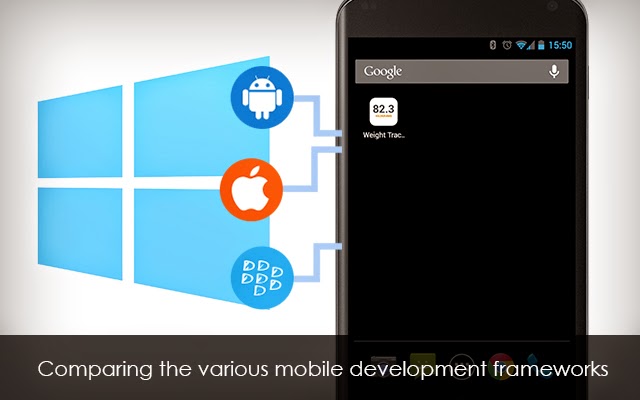Comparing the Various Mobile Development Frameworks
 A steady increase is being noted in the number of enterprises investing in mobile app development. The objective of mobile development projects, however, varies from one business to another. But each business wants to make its mobile app popular by optimizing user experience. The mobile development frameworks have made it easier for businesses to develop, deploy and market mobile applications within shorter amount of time. Based on the nature and requirements of the mobile app development project, a business also has option to choose from a large number of mobile development frameworks. That is why; it becomes essential for the business to compare these frameworks based on five important criterions.
A steady increase is being noted in the number of enterprises investing in mobile app development. The objective of mobile development projects, however, varies from one business to another. But each business wants to make its mobile app popular by optimizing user experience. The mobile development frameworks have made it easier for businesses to develop, deploy and market mobile applications within shorter amount of time. Based on the nature and requirements of the mobile app development project, a business also has option to choose from a large number of mobile development frameworks. That is why; it becomes essential for the business to compare these frameworks based on five important criterions.
Five Important Criterions to Compare Mobile Development Frameworks
1) Type of App
The choice of mobile app type varies from one enterprise to another. According to its objectives and requirements, a business can develop a variety of applications like native app, hybrid app, web app and mobile website. So it becomes essential for the business to compare the mobile development frameworks according to the type of app it wants to build. There are also several frameworks like Apache Flex, Appcelerator Titanium Mobile, DHTMLX Touch, Dojo Mobile, Framework7 or Gideros that can be used by the business to create different types of mobile applications.
2) Mobile Platform
Nowadays, most businesses prefer developing apps for multiple mobile platforms including iOS, Android, Windows Phone, Blackberry OS, WebOS, Java ME and Bada. But the mobile platforms supported by individual frameworks differ. So it is important for the business to pick a framework that supports specific mobile platforms. However, the enterprise also has option to use mobile development frameworks that support hugely popular mobile platforms like iOS, Android and Windows Phone. It can use frameworks that support multiple mobile platforms including Application Craft, DHTMLX Touch, ChocolateChip-UI, Dojo Mobile, Gideros, eMobc, and CNET iPhone UI.
3) Programming Language
A business can always reduce mobile app development cost by leveraging the programming skill of its existing developers. But each mobile platform requires developers to write apps in a specific programming language. For instance, the IOS, Android and Windows apps must be written in Objective-C, Java and .NET respectively. That is why; a business must consider the programming language required for creating the apps. As PhoneGap, jQuery Mobile, Sencha Touch, Ratchet or Ionic are powered by HTML5, CSS and JavaScript, these frameworks can be used by website developers to create robust mobile apps.
4) User Interface Features
While choosing a mobile development framework, a business must consider the user interface (UI) features it must support. Normally, the frameworks support three distinct UI features including widgets, corporate design and accessibility. Some frameworks support only widgets, whereas others support only corporate design. However, a business can still use frameworks that support these three UI features. For instance, PhoneGap, Rhodes, Sencha Touch, RareWire, Quick Connect, NimbleKit, V-Play and qooxdoo support these three distinct user interface features.
5) Hardware Features
The hardware features supported by the mobile development framework will have a huge impact on the app’s user experience. So the businesses need to evaluate the hardware features supported by individual mobile development frameworks. Based on the nature of the mobile app, there are chances that a mobile development framework has to support a number of hardware features including camera, compass, contacts, geolocation, files, notification, storage, message, Bluetooth, and native events of the device. The required hardware features to be supported by the framework can be decided based on the app’s features and functionality.
The rapidly increasing popularity of mobile apps has encouraged many companies to launch new mobile development frameworks with new features and enhanced capabilities. So while comparing mobile development frameworks, a business must not ignore the recently launched frameworks. However, it is always important for the business to compare these frameworks based on the app’s usage and user experience.
You can get in touch with a offshore mobile application development company who can help you build apps within allocated budgets and time schedules.
If you would like to hire expert mobile app developers for your mobile app development needs, please contact us Mindfire Solutions.
